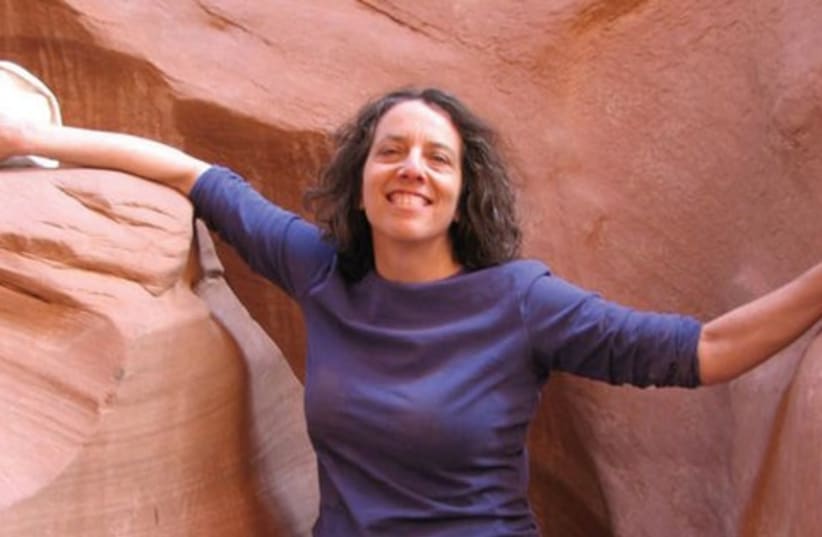If a specified tragedy ends Whitethorn, an unspecified tragedy begins it. On one level, “Poem for Jenne,” like “Puertas,” is a poem about bearing witness. Jenne is a neighbor, with a lavishly flowering garden, who is beset by some misfortune. The poet wrestles with the insufficiency of nature, as well as the insufficiency of her own poetry, as approaches to another’s pain.Her words, she decries, the good ones, anyway—will quit this page before I ever pay this garden homage or name the pain I’m trying to assuage.
Still, the poet sanctifies beauty as the midwife of renewal:
earth’s reaching for her heavens, I for words
Delphinium. Larkspur. Larkspur. Delphinium.
Let me claim you as you climb and climb.The contemplation of beauty in unlikely and improbable places is to be found early in Osherow’s poetry. In her 1988 collection, Looking for Angels in New York, her first published book, there is the poem “South for Winter”.In winter England, I wanted to embroider Africa.
I visited the shops daily, choosing colors, and ended up with every purple ever made, eleven greens and so much red and orange I bought the same persimmon eleven times.
For a poet of austere line forms, Osherow is able to sail towards the reader with a conversational warmth that takes one by surprise.Intimacy, it goes without saying, is not necessarily the spawn of rigor.In some of her poems, she will nuzzle up to her readers with her secrets. She begins Dead Men’s Praise, her fourth, and one of her most Jewish volumes (1999), with the lines:I want to write a poem in Yiddish and not any poem, but the poem I am longing to write, a poem so Yiddish it would not be possible to translateTwelve years later, in her title poem, “Whitethorn”, she laments:It’s my greatest failing. I never learn or, rather, don’t apply the things I know which is why I have so little to show for my quickly coming up on fifty years.Osherow touches upon more Jewish themes in her poetry than almost any Jewish poet one can think of: praying in the women’s section at Jerusalem’s Western Wall, Isaiah and Hosea, Yiddish muses, wry commentaries on Biblical commentaries, riffs on Lubavitch Hassidim, reflections and elegies on the Holocaust.“I think I write about so many Jewish subjects because I live in Utah,” she relates to The Jerusalem Report in an email. Born in Philadelphia and raised in a Conservative Jewish home, Osherow has spent the last 23 of her 55 years teaching creative writing at the University of Utah.In her Holocaust poems she manages to step lightly and precisely on unbending ground. The poem “Psalm 37 at Auschwitz” is from Dead Men’s Praise.I could try asking my father-in-law If,
in all his years at Auschwitz-Birkenau,
He ever once overheard a psalm.But I know the answer, just imagining him Giving me the slightly baffled stare He keeps in reserve for these conversations That says: where do you find these foolish questions? And then: How could you know? You weren’t there.“Orders of Infinity” her Treblinka (once the name is uttered, calm is lost) pilgrimage poem, from Whitethorn, dissects the dark journey many Jews have been making in recent years.The forest one unbroken spell of green and I was in that whole vast space alone.
But I worried that my traveling companion (we’d foolishly shown up there at high noon; she’d gone back to the woods to find some shade) had long been waiting, wanting to leave; otherwise I might have stayed and stayed at least until I managed to believe that the place where I was walking was Treblinka.Osherow’s distance from the power spots of Judaism (Jerusalem, Safed, Uman, Manhattan’s Upper West Side) has enabled her sense of humor to percolate deliciously in exile together with her sense of tragedy. A striking and very appealing aspect of the poet’s work is the way she ranges fearlessly and unselfconsciously from heavy to light.Her “Sonnet from The Song of Songs” in Whitethorn sings:I tried to write you a sonnet; it wouldn’t work.
Here’s what I would write if you weren’t crazy was the way it started. But you are crazy so I just let the laptop screen go dark.
Her Hosea poem in “The Hoopoe’s Crown” is a fast dance of comic reviling.
Me? I can’t even
read him on an ideal
afternoon at the perfect
distance of a holy
language. But it
turns out I’m the one
he’s talking to: hey,
big mouth poet,
lifting the gem-
stones from the Bible:
take the words with you
and return to God.
–
I love the way
he doesn’t say
which ones.
I’m tempted to
bring along the
entire dictionary;
that way, god can
choose whatever words
He likes.Osherow’s “Slim Fantasia on a Few Words from Hosea” is one of her signature long poems.It may move across her pages in riotous bursts, but it goes on for seven pages. The poet attributes her proclivity to writing long poems to the time constraints of child rearing (and her basically discursive nature.) As a young poet, she’d have to spend long periods of time “incubating” her poems. When she finally had the time to write them, she found herself gathering together all the stray bits and pieces, all the unattended connections that waited to be included.There is a poem in Whitethorn called “Proust on a Slow Train from Grosseto” (another long poem):In truth, the antique carriage suited Proust,
Its start-and-stop, its slow eccentric rhythm, each square of sky intensely overcast Whitethorn is somewhat like an intriguing slow journey, darkly lovely, introspective, stretching across landscapes human and natural, Jewish and non-Jewish, moving the way a fiercely awake mind moves as it oars deeply into life.Whitethorn: Poems By Jacqueline Osherow Louisiana State University Press 96 pages; $17.95
